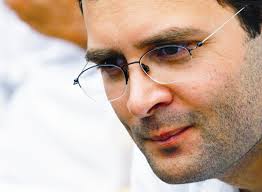New Delhi, Jan 16: Congress vice president Rahul Gandhi will lead the party's campaign for the 2014 Lok Sabha elections but will not be declared prime ministerial candidate, the party said Thursday.

Congress general secretary Janardan Dwivedi told reporters after the CWC meeting that there was a demand from several leaders to declare Rahul Gandhi the prime ministerial candidate but party president Sonia Gandhi intervened to say that the Congress did not have the tradition of declaring a prime ministerial candidate.
He said the CWC decided that the resolution be moved at the AICC meeting.
"This meeting of CWC declares that the 2014 election campaign will be led by Rahul Gandhi," Dwivedi said reading out the resolution.
Dwivedi said Sonia Gandhi told the meeting that it was not necessary for the Congress to declare a prime ministerial candidate even if some other party had done so.
The Bharatiya Janata Party (BJP) has declared Gujarat chief minister Narendra Modi its prime ministerial candidate.
Dwivedi said it was always known in the Congress who will lead the poll campaign.Answering queries, he said the resolution means that the 2014 elections will be contested under "one leadership".
He said the party has been consistently saying that Rahul Gandhi was the party leader next to Sonia Gandhi.
"Rahul Gandhi is the leader of the future," he said.
Meanwhile, Rahul Gandhi said he was always ready to discharge any responsibility given to him by the party.
He also said there were attempts to strike at the Congress ideology and there was a need to strengthen it.
Dwivedi said the party's election leaders were known from the time of Jawaharlal Nehru even if there was no announcement of the prime ministerial candidate.
He said an announcement was made about Manmohan Singh's candidature as prime minister ahead of the 2009 Lok Sabha polls as he was already holding the position.
Manmohan Singh had announced earlier this month that he will not be seeking another term as prime minister.
Sources said several CWC members at the meeting asked the party-led United Progressive Alliance government to take immediate steps to check price rise.
They demanded an increase in subsidised cooking gas cylinders from nine to 12 for each household.
They said the concerns were targeted at Petroleum Minister M. Veerapa Moily, Finance Minister P. Chidambaram and Prime Minister Manmohan Singh, who were all present at the meeting.






Comments
Add new comment